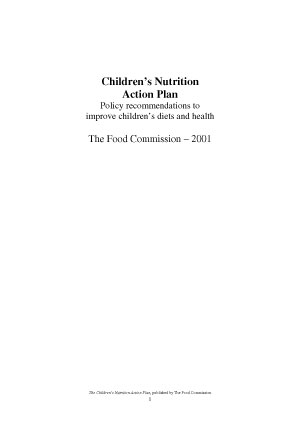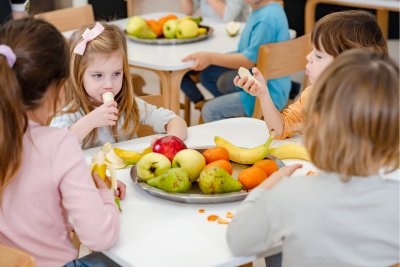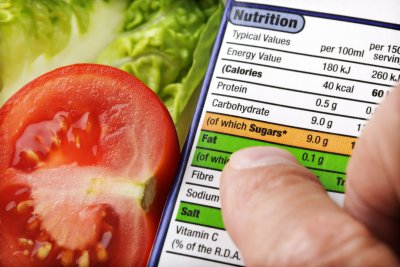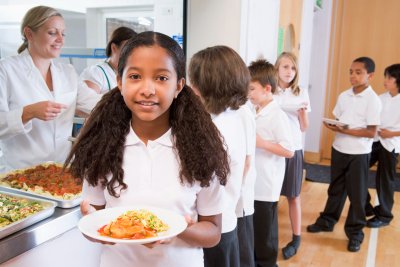
Children's Nutrition Action Plan 2001
The Children's Nutrition Action Plan resulted from a roundtable seminar of children's health experts, convened in 2001 to review what policies would be needed to control the rising epidemics of diet-related disease prevalent in the UK and worldwide.
When this report was published in 2001, there was mounting concern over European rates of heart disease and cancer, and rising incidence of obesity. The World Health Organisation’s nutrition office for the European Region had launched a four-year Food and Nutrition Action Plan which considered some of the issues looked at in this document. The UK Department of Health had launched a series of policy documents on public health policy which included food, diet and nutrition concerns. Also, the recently launched UK Food Standards Agency was also developing a nutrition policy.
Children’s food is a key element of food policies for several good reasons. For a start, what children eat not only affects their health at the time, but will make a significant difference to their later health. For instance, after around the age of four, children who are overweight are increasingly likely to be overweight or obese as adults. Before they reach their teens, children can show the first signs of cardiovascular disease in the tissues of their arterial walls. By this age, girls have already begun to lay down the nutritional base for their future pregnancies, which in turn will affect the foetus and long-term health of their children. Nutrition in childhood is therefore of importance for public health and the costs to our health services for years to come.
Children are less able to make decisions about their own best interests than are well-informed adults. The regulation of people’s free choice about the foods they eat is often attacked as ‘nannyism’ but this fails to apply when it comes to children. We acknowledge the need to protect children through social controls – we ban the advertising of alcohol and tobacco to children, and we prohibit children from buying drink and cigarettes until they are considered old enough to know what they are doing. But with food, society has been less assertive and has allowed the free-choice and free-market arguments to prevail.
This state of affairs is doing our children no good. The Children's Nutrition Action Plan reviews some of the main issues that concern children’s food and nutrition, and looks at possible interventions or targets that might be constructed, to help us protect children’s health in the future and improve what children are eating.
The Chidren's Nutrition Action Plan was coordinated by the Food Commission, the UK’s leading consumer watchdog on food issues. Sustain contributed to the Children's Nutrition Action Plan consultation process, and now looks after the Food Commission publications archive.
Report contents
Part 1 Children’s Nutrition
- Report on current issues from the round-table meeting
Part 2 Targets and Interventions
- Note on nutrition policies and the role of central government
Contributions from expert witnesses
- Dr Tim Lobstein – The Food Commission: Children and food: what’s been going wrong? The need for an Action Plan
- Professor Philip James – International Obesity Task Force: The last children’s nutrition initiative and what went wrong. Lessons for government policy
- Jeanette Longfield – Sustain: The alliance for better food and farming: Do children need Nutrition Action?
- Paul Lincoln – The National Heart Forum: Report on the young@heart initiative
- Jenny McLeish – Maternity Alliance: State benefits – developing new approaches for supporting mothers and children
- Mary Daly – Senior Health Visitor: New parents; the role of health visitors and other support mechanisms
- Joe Harvey – Health Education Trust/School Nutrition Action Groups: Nutrition groups in schools, school meals and school classes – next steps
- Judy More - Paediatric Group of the British Dietetic Association: The importance of drinking-water provision in schools
- Professor Fergus Lowe – School of Psychology, Bangor University: Education and change: what we can do in schools, and what we need to do it well
- Tim Marsh – UK Public Health Alliance: Child Poverty Action Group’s School Meals Campaign – issues for low-income families
- Polly Munday – Community Dental Health Department: The national school fruit scheme – how it works, and what lessons can be learned
- Professor Aubrey Sheiham – Action and Information on Sugars: Improving children’s dental health -- what has been tried and what is needed
- Iona Lidington – Community Nutrition Group: A successful campaign – Chuck Sweets off the Checkout. But then the sweets crept back...
- Lizzie Vann – Baby Organix: Good and bad food manufacturers – an insider’s view on how companies can be changed
- Wendy Wrigley – Co-operative Wholesale Society: Retailers can use own label foods to change sales patterns
- Charlie Powell – Sustain: The alliance for better food and farming: Marketing to children – weakness and strengths in voluntary and statutory controls
- Patti Rundall – Baby Milk Action: Holding companies accountable – strategies for changing corporate behaviour
- Tom Murray – Head of Nutrition, Food Standards Agency: The Food Standards Agency’s policy measures to improve children’s nutrition
- Imogen Sharp – Department of Health: Government moves to improve food and nutrition. Overview of action in schools
Issues, targets and interventions
1. Nutrition for babies and pre-school children
- Issues to be addressed:
- Nutrition before and during pregnancy
- Breast and bottle feeding
- Infant nutrition
- Targets and interventions
- Nutrition before and during pregnancy
- Breast and bottle feeding
- Infant nutrition
2. Nutrition in school-age children
- Issues to be addressed:
- What school-age children are eating
- Health outcomes in childhood and adulthood
- Children’s dental health
- Targets and interventions:
- Whole-school nutrition policies
- Other policy measures for improving health in school-age children
3. Food manufacturing, retailing and marketing
- Issues to be addressed:
- Advertising and marketing food to children
- Targets and interventions:
- Actions currently being taken by retailers to encourage healthy eating
- Other policy measures to improve the manufacturing, retailing and marketing of food to children
4. References
Children's Food Campaign: Campaigning for policy changes so that all children can easily eat sustainable and healthy food.
Sustain
The Green House
244-254 Cambridge Heath Road
London E2 9DA
020 3559 6777
sustain@sustainweb.org
Sustain advocates food and agriculture policies and practices that enhance the health and welfare of people and animals, improve the working and living environment, promote equity and enrich society and culture.
© Sustain 2026
Registered charity (no. 1018643)
Data privacy & cookies
Icons by Icons8







